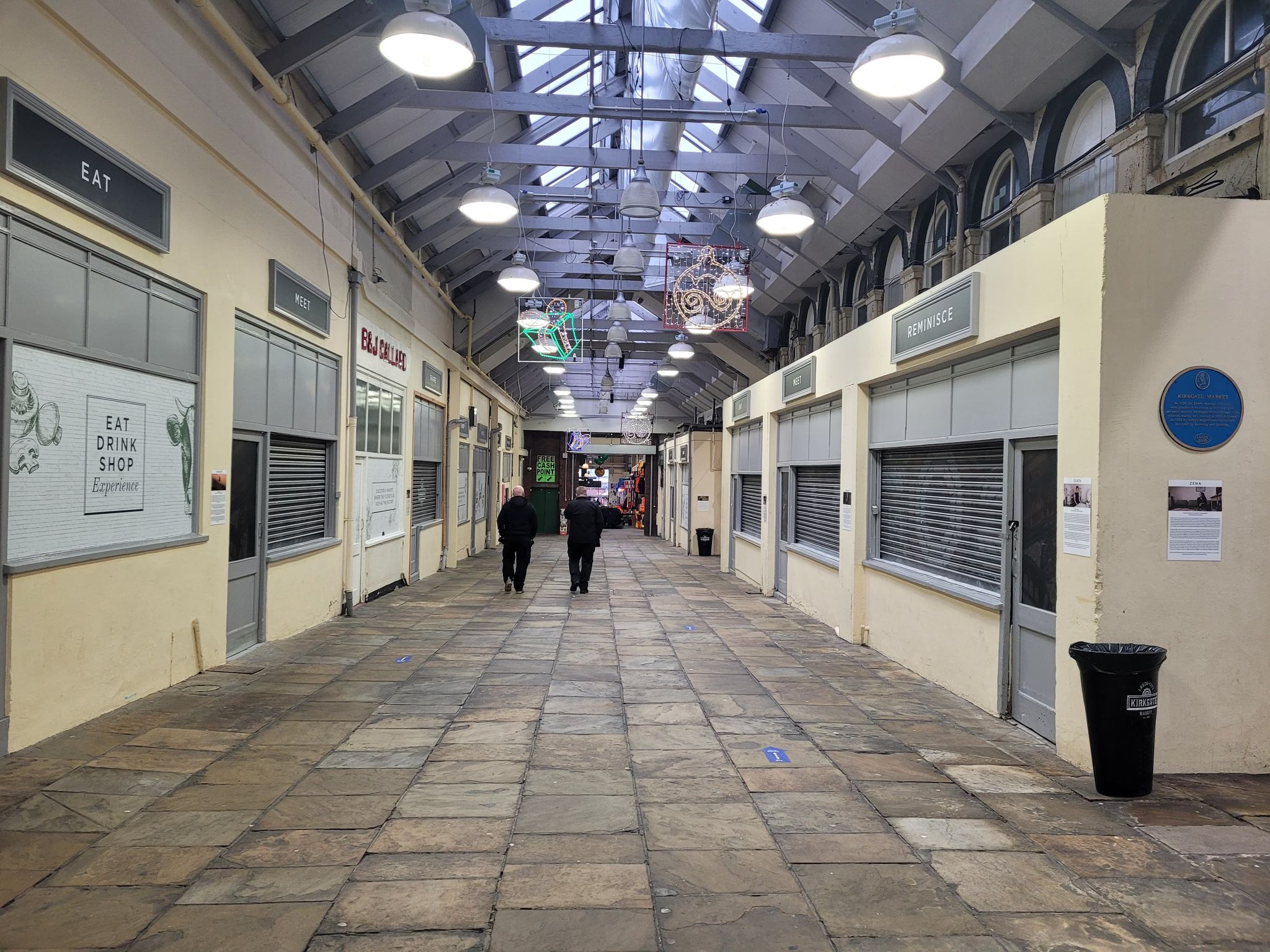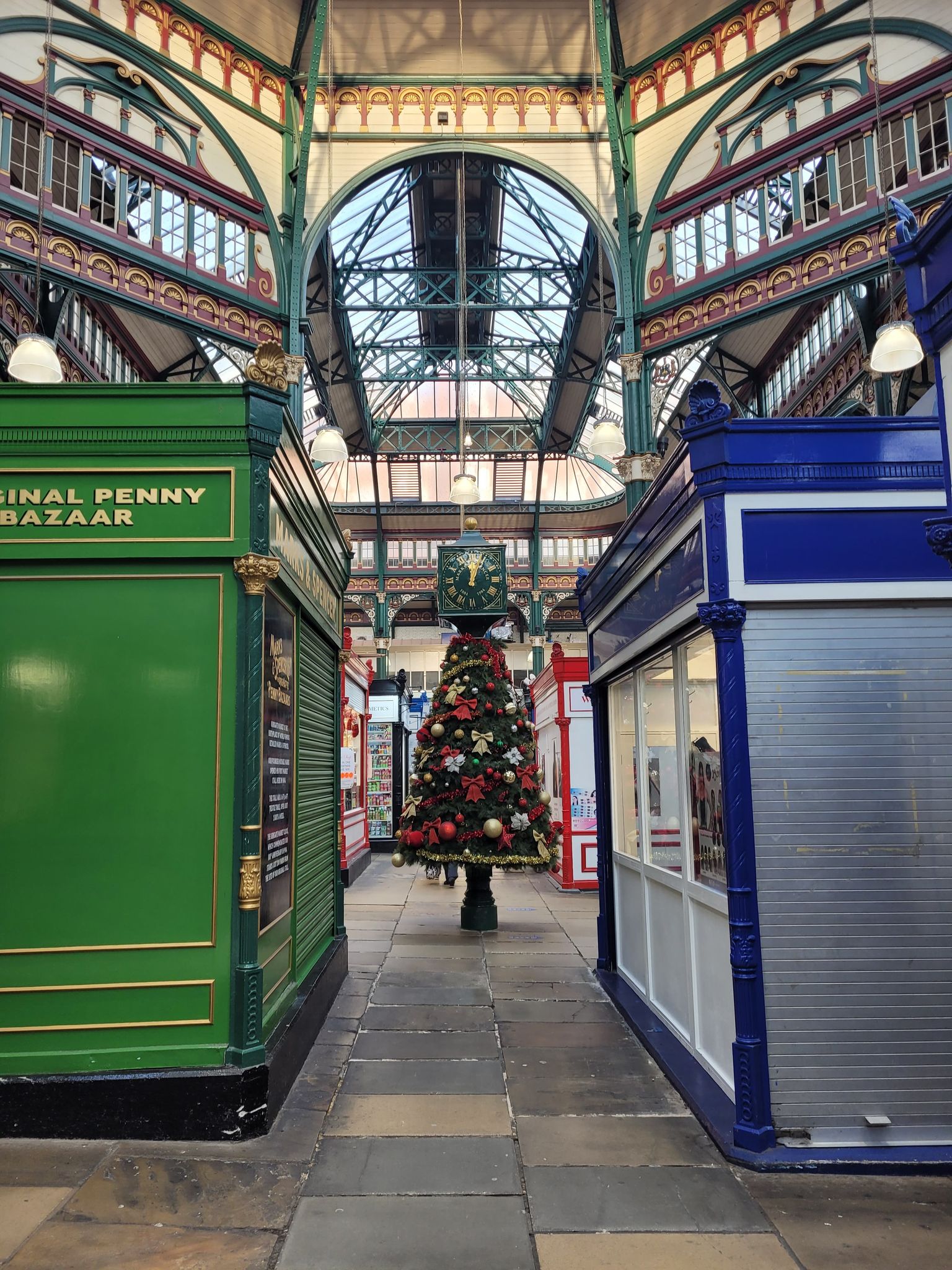The Virus That Stole Christmas: How Coronavirus Could Kill UK's Markets
By Tom Robinson | Coronavirus | 20th December, 2020

COVID-19, a virus that’s spread across the world, could be the greatest challenge UK’s traditional markets have seen in decades. One of Europe’s largest indoor markets, Leeds Kirkgate, has seen a severe decrease in footfall in the run up to Christmas; something that traders are concerned could be the final nail in the coffin after years of uncertainty.
For many, Christmas shopping commences on the famous Black Friday. However, this year, discount signs hung beside locked doors, whilst mannequins stared out towards soulless, barren streets. The nation's second lockdown pushed the high-street's padlock firmly closed.
Desolation spread like a virus into the heart of the city that day as only essential traders were authorised to pull their shutters up. The market’s impressive ornate facades, topped by large, grey domes pointing to the sky seemed overkill, as the market stood motionless.
Butchers hoisted pig carcasses onto chopping boards for prime cuts of meat to go left unsold; a row of perfectly green Christmas trees lined the walls of the entrance as a proud display, their hand-written tags untouched.
The hall, at this time, would usually be filled with jubilant Christmas shoppers but now didn’t display a single smile. The year had been tough and the following weeks were make or break.
Joanne Johnson, well known around the market for her longstanding commitment to The Nut Shop, stood sanitizing her counter. Her face framed by large jars of nutty treats.
“It’s cut our Christmas trading in half,” a usually bubbly personality, now deflated with despair. “We’re six weeks away from Christmas, this should be our busiest time. We’re getting slaughtered. Just as we were gaining momentum at the back end of summer, we’re struck with more restrictions, this time, just weeks before Christmas. Usually there’d be three of us behind this counter, but now it’s just me, working 6 full days every week. I simply can’t afford help.”
Joanne had worn the red and white pinstriped apron for 37 years, having landed a Saturday job at 14. Now at 51, she recognises Coronavirus as the biggest threat since the shop’s opening nearly 7 decades ago.
However, a feeling most common among the essential traders that day was hope. Joanne voiced concerns that she might even be overrun if people were to return the following week, once the country returned to a tier system, allowing all stalls to reopen for business, bringing busy Christmas shoppers with them.
But no. Their hope was a misjudgement of the future. For, a week later, despite lockdown restrictions being lifted, frequent shoppers of the market remained hesitant to return.
“I believe it’s because of the demographic of the market,” Steve Firth, owner of a small bakery stall pondered, “our typical customer is either elderly, or an office worker, neither of which are in the city right now.” He stood with a defeated posture, dividing bread buns into packs of six.

A man approached as he continued, “it’s been heart breaking, truly heart breaking. We’d usually have a persistent queue wrapped around here all day.” He spoke with a furrowed brow as he gently placed the final bread buns into the plastic wrap before slowly trudging over to the customer.
“If I’m frank, I can’t guarantee you a job in four weeks' time. If you’re offered another job, just take it. Don’t bother with notices and the likes, just take it,” he selflessly urged his team just weeks before the second lockdown. “Don’t worry about me, just save yourselves.”
Although, despite hopes for a climb out of tier 3 just moments before Christmas, the country was notified on December 17th that no region would have restrictions lifted. Leader of Leeds City Council, Judith Blake, voiced her grief by saying whilst the decision is one taken by the government, “our view is that Leeds could safely be moved to Tier 2.”
With just a week left before Christmas, not much had changed in the tight corridors between the stalls.
“Don’t forget it’s mad Friday too,” a trader reminded me as I asked about the quietness. A day that would usually see frantic, last-minute shoppers, remained woefully tranquil, mirroring the Black Friday just weeks before.
Sat alone, defying the black and yellow tape on the red stools of Café Express, was an elderly man, shopping for a final time before Christmas. Mr. Miller awaited his usual order from the café stall he’d frequented for years, placing his thin, blue market carrier bags on the cold concrete beside him.
“I’m only sitting here because of my back,” he chuckled, acknowledging that he was breaking the rules as the café owner handed him a coffee in a white, Styrofoam cup. He dressed smartly. His long green, knee length overcoat appeared impeccably brand new, despite being over fifty years old. His mouth obscured by a brown mask his wife had hand-sewn in May.
“I’m 72 now and I’ve been coming to this market since I was 5, so you do the maths,” he told me, patting his platinum hair down with one hand, warming his other with the steam from his drink. “At this time back then, I’d have been lifted from the floor as I tried to walk, it would have been that crowded. Supermarkets and the online have threatened this place, this virus has simply finished it off.”
Grocery shopping will continue, for most, under the fluorescent lights of the soulless supermarket, buying plastic-covered goods from self-checkouts. The purchase of luxuries will remain behind the computer screen as we all evolve into greater consumption machines and grow further apart from one another.
@LeedsMarkets opening times over the Christmas period. Please check with individual businesses as to their opening times as these may be subject to change.#buyleeds #LeedsChristmas #KirkgateChristmas -
— Leeds Markets (@LeedsMarkets) December 17, 2020
Make it independent this Christmas 👍😍 #supportlocal pic.twitter.com/OaoXUs5Iwn
Unlike larger chain stores and supermarkets, the stalls that reside under the large domes of Kirkgate Market are families. They’re small groups of hard workers who graft each day in the cold. Who knows how long markets and their traders will be able to continue battling the odds to stay trading?
Joanne looked up as I walked towards the exit, wishing me a Merry Christmas. The hope that had been extinguished in November now seemed to be replaced by acceptance, “I’m just trying to put a smile on and enjoy Christmas. We’re just about managing to keep our heads above water for now. Though I daren’t even think about January.”
